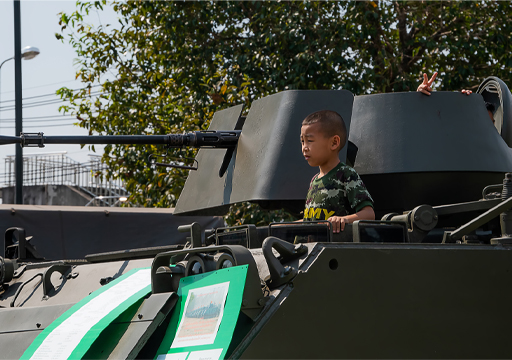2.2 Child soldiers
In countries such as Sierra Leone, Afghanistan and the Philippines where there is or has been war or armed conflict, thousands of children have been forced to become soldiers. Often, they are recruited as cheap labour and, because children often go ‘under the radar’ of adults, they can be useful spies.
However, as you’ll see in the video in the next activity, they are also trained to kill. In civil war, this may involve attacking people within their own communities.
Activity 3 Experiences of a child soldier
Watch the following short video from Unicef, which recounts the experience of James, who was taken to be a child soldier. James’ story is presented as an animation, but you may find the content upsetting.
Video: James – a boy soldier [Tip: hold Ctrl and click a link to open it in a new tab. (Hide tip)]
Now consider the following questions:
- Do you think James had a choice about becoming a soldier?
- Can you try to imagine the feelings he experienced while shooting at people in his own village?
- After he returned to his village, what do you think the impact of being a soldier will have had on James, his family and the people in his village?
Discussion
You may have decided that James did not have a choice about becoming a child soldier: he would have been shot if he didn’t cooperate, and there would have been repercussions on his family. The feelings that James would have had when he was forced to shoot his own friends, neighbours and even his own family are difficult to imagine, but again, he had little choice.
James had a terrible experience, but he was lucky to have been rescued and returned to his village. The immediate euphoria of being reunited with his family may soon have been replaced by feelings of guilt over what he had been forced to do in order to survive. James may have felt that he no longer belonged to his village in the same way that he did before he became a child soldier. Perhaps the villagers blamed him for some of his actions rather than the adult soldiers who recruited him.
Of course, this is speculation; how James viewed his future at that time, and how his physical and mental health was following his experiences will have depended on the support he was able to access, as well as the resources that were available to him.

